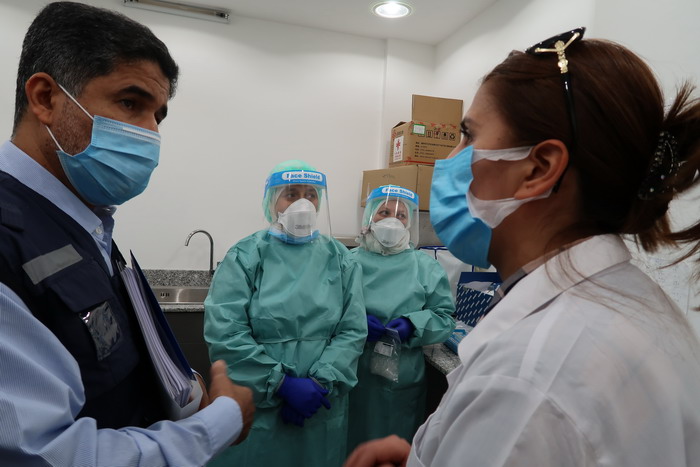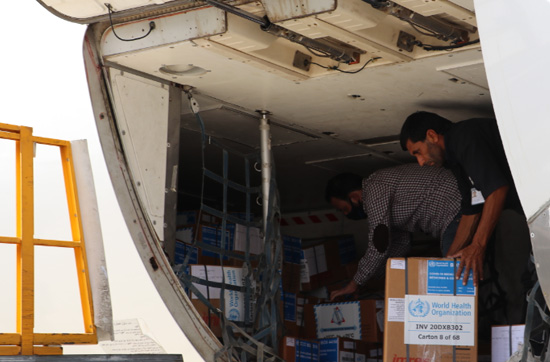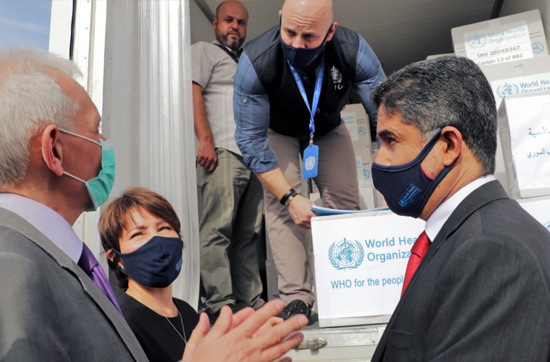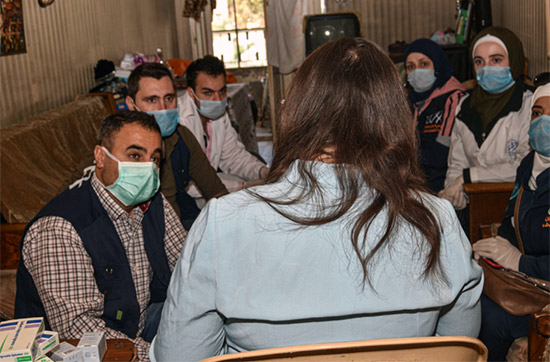WHO Regional Director's statement on his mission to Syria
 8 November 2020 – I recently returned from a 4-day mission to Syria, where I met with officials at all levels, health workers, partners, academia, and others to learn more about the overall health situation, find new ways of working together to strengthen service delivery, protect Syrians from current threats, and help strengthen the devastated health system.
8 November 2020 – I recently returned from a 4-day mission to Syria, where I met with officials at all levels, health workers, partners, academia, and others to learn more about the overall health situation, find new ways of working together to strengthen service delivery, protect Syrians from current threats, and help strengthen the devastated health system.
I met frontline health workers and patients in Damascus, Homs and Hama, including 6-year-old Jaafar, who depends on dialysis sessions 3 times a week at a WHO-supported NGO-run health care centre in Homs to stay alive and grow up. Doctors at the same centre told me of a single mother of 2 blind boys who had waited 2 years for a heart angioplasty, and was finally able to have this life-saving operation only last week.
At the Children’s Hospital in Damascus, I visited the new emergency department rehabilitated by WHO with support from Japan, which sees on average 300 children a day. There, I saw dedicated staff receive patients referred from throughout the country with burns, injuries and life-threatening infections.
Throughout my time in Syria, I met doctors, nurses, and other health staff who had braved years of working under threat of attack during the war, and yet stayed to save lives despite few resources. “We used to serve our people in normal times; imagine what we have faced, and what we are facing now,” one doctor told me.
At WHO, we talk about the resilience of health systems, and their importance in ensuring the health and well-being of all people, especially during crises. But in Syria, I saw the resilience and positive spirit of people who have not given up, and who – despite almost a decade of despair – are determined to restore their country to peace and prosperity.
But devastation due to war is still evident in Syria, and new complexities – such as COVID-19 – have added to the burdens of people already fatigued by the ongoing conflict, disease outbreaks, and natural disasters, including the recent wildfire that have destroyed livelihoods of many.
 Half of all health professionals are still outside the country, only 48% of public hospitals and 48% of primary health care centres are fully functional. Health workers, medical supplies, equipment and medicines are still in short supply. Almost one fifth of locally produced medicines are becoming unavailable due to the effect of the economic crisis on local pharmaceutical production.
Half of all health professionals are still outside the country, only 48% of public hospitals and 48% of primary health care centres are fully functional. Health workers, medical supplies, equipment and medicines are still in short supply. Almost one fifth of locally produced medicines are becoming unavailable due to the effect of the economic crisis on local pharmaceutical production.
People are suffering and dying due to lack of medicines for conditions such as hypertension, diabetes and kidney failure. Poor-quality equipment used over 2 shifts day and night is being stretched to the limit due to high demand and constraints in importing spare parts; sanctions have aggravated an already difficult situation, affecting all people and all sectors, especially the health sector.
Skilled doctors are desperate for resources that will allow them to perform life-saving surgeries and other medical procedures. Medical students are determined to serve their country yet are frustrated at the many gaps they will face as front-line providers.
Having survived war, hunger, and disease, the Syrian people now have another threat looming over them: like many countries around the world, we expect another wave of resurgence of COVID-19 cases in Syria.
As we continue to deliver supplies and expand testing capacity throughout the country through “all-modalities” approach, I saw high-level commitment across all levels of partners and all sectors for controlling the pandemic in line with WHO recommendations. However, testing capacity remains limited, adherence to mask use and physical distancing by the public remains low, and health workers remain at high risk due to lack of personal protective equipment.
The people of Syria have a long, hard road ahead. But despite the destruction and deprivation, there is enormous resilience and encouraging hope. We are with all Syrians every step of the way, especially the most vulnerable, in whatever circumstances they find themselves Despite all challenges, they have managed to maintain a basic level of health care that we can build on with support from the international community and our committed partners, within the country and beyond.
WHO Regional Director for the Eastern Mediterranean hands over medical supplies during his visit to Syria
 24 October 2020, Damascus, Syria – A chartered aircraft has landed in Damascus International Airport from the WHO's logistics hub in Dubai, carrying WHO supplies to support the health response in Syria. The 8.8-ton shipment includes medical kits and medicines for almost 2000 beneficiaries and enough personal protective equipment to protect more than 4000 health care workers.
24 October 2020, Damascus, Syria – A chartered aircraft has landed in Damascus International Airport from the WHO's logistics hub in Dubai, carrying WHO supplies to support the health response in Syria. The 8.8-ton shipment includes medical kits and medicines for almost 2000 beneficiaries and enough personal protective equipment to protect more than 4000 health care workers.
“Health care workers are the backbone of any health system, and protecting them is protection for us all,” said Dr Al-Mandhari, WHO Regional Director for the Eastern Mediterranean Region, who handed over the supplies to health authorities soon after he arrived in Damascus today for a five-day mission.
“These supplies will strengthen the health sector’s response against COVID-19 across Syria. One of our main priorities is to take measures to maintain the safety of all medical staff and front-liners in health facilities who are sparing no effort to respond to this pandemic despite the challenges on the ground,” Dr Al-Mandhari added.
 The humanitarian shipment arrives at a critical time, when Syria, like many countries in the Region, is expecting a surge in the number of COVID-19 cases. As part of preparedness and response, WHO is working closely with all partners to strengthen surveillance, enhance testing and laboratory capacity, support health services, and ensure the delivery of life-saving medicine and equipment.
The humanitarian shipment arrives at a critical time, when Syria, like many countries in the Region, is expecting a surge in the number of COVID-19 cases. As part of preparedness and response, WHO is working closely with all partners to strengthen surveillance, enhance testing and laboratory capacity, support health services, and ensure the delivery of life-saving medicine and equipment.
As a result of the 10-year conflict and its impact on the national health system, WHO classifies Syria among high-risk countries in the Region, due to devastated health infrastructure and limited availability of health care services. International sanctions further hinder Syria’s national capacity to cope with the COVID-19 pandemic, causing an unprecedented socioeconomic burden on the Syrian people.
WHO-supported mobile teams deliver mental health care in Syria
 14 October 2020, Syrian Arab Republic – Amid the COVID-19 pandemic, movement restrictions and lockdowns can have as much of a negative impact on people as the virus transmission itself. Patients needing mental health services are most affected, especially those struggling to access treatment at a health care facility. In Syria, 75% of people with mental health conditions receive no treatment at all, and the current pandemic is further aggravating the situation.
14 October 2020, Syrian Arab Republic – Amid the COVID-19 pandemic, movement restrictions and lockdowns can have as much of a negative impact on people as the virus transmission itself. Patients needing mental health services are most affected, especially those struggling to access treatment at a health care facility. In Syria, 75% of people with mental health conditions receive no treatment at all, and the current pandemic is further aggravating the situation.
“There is no health without mental health. We live in an environment where mental health needs are greater than any other place. WHO works with health partners across the whole of Syria to ensure the medicines and health services for mental health patients are available, while reducing their risk of exposure to COVID-19,” said Dr Akjemal Magtymova, WHO Representative in the Syrian Arab Republic.
WHO-supported mobile teams in Aleppo provide home visits to mental health patients
“My mother, sister and two brothers suffer from schizophrenia. In addition, my 9-year-old younger brother is always in seclusion,” said 30-year-old Kawthar.
“During the COVID-19 lockdown earlier this year, there was no public transportation, and I couldn’t get to the hospital, which is quite far, to buy medicines. As a result, their symptoms started worsening; they started hallucinating, their speech was largely disorganized, and they started having bizarre visions,” she added.
To help thousands of people like Kawthar’s family, WHO continues to support health partners to ensure that medicines and health services for mental health patients are available. To reduce the risk of exposure to COVID-19, patients who used to visit the WHO-supported Mental Health Hospital are now visited at home by mobile teams.
Supported by WHO, the mobile health teams serve more than 1500 people in different areas across Aleppo with a wide range of health services such as nursing, mental health and psychosocial sessions, and COVID-19 awareness sessions. They also provide treatment as needed.
Scaling up mental health services in northwest Syria
“Mental health is of particular importance in northwest Syria, where a fragile context has placed additional stress on a vulnerable population who have been living in a dire situation for the last 10 years,” said Dr Mahmoud Daher, head of the WHO Emergency Field Programme in Gaziantep, Turkey.
Where initially there were only 4 psychiatrists serving a population of over 4 million in 2016, WHO has significantly scaled up the training of over 160 doctors and nearly 450 psychosocial workers to provide non-specialized mental health and psychosocial support services in primary health care centres across northwest Syria. Over 20 local organizations inside northwest Syria are operating over 160 facilities to provide mental health care and psychosocial services to 71 communities and 29 sub-districts across the region.
To respond to COVID-19, WHO has partnered with a local nongovernmental organization to implement mental health and psychosocial COVID-19 helplines to support frontline workers, patients, and their respective families to understand and cope with the pressures of the pandemic. Three hotlines are currently active to support individuals across northwest Syria and in southern Turkey.
Syrians take steps in journey of acceptance of mental health needs
Despite the stigma that continues to prove a barrier for patients in accessing mental health care, health partners are noticing an improvement in behaviour change among Syrians, with individuals becoming more self-aware and seeking help when they experience symptoms immediately, instead of waiting until their condition is critical.
Ms Ola Alshab, a psychosocial worker with a WHO implementing partner, provides mental health services to communities living in Idleb.
“Mental health is important. We live in a society that has been affected by war and generally has a lack of understanding regarding mental health and psychosocial needs,” she says.
Despite the still-existing stigma, Ms Alshab has noticed an improvement.
“People have become more accepting of mental health and psychosocial services. When they see the list of symptoms that characterize basic mental health conditions, they can relate to them and ask for help. When they see that a member of their family is benefiting from care, it makes a difference.”
WHO declares first COVID-19 case among residents in Syria’s Al Hol camp
Damascus: August 27, 2020 – WHO confirmed today the first COVID-19 case among residents in Syria’s Al Hol camp. The female patient is 29 years old and in stable condition. She is being treated in an isolation area in Phase 7 of the camp, where a national NGO, in partnership with WHO, is providing case management support.
Health workers have already begun contact tracing and will be monitoring all close contacts for COVID-19 symptoms. WHO is collaborating with camp authorities and partners to engage communities, reinforcing messages about measures that they can take to protect themselves.
A lockdown will also be imposed in Phase 7 for the next 14 days.
WHO continues to monitor the situation in Al Hol camp and has mobilized 6 mobile teams in 6 locations to scale up health activities in the camp. We have also established sub-committees that look into all aspects of COVID-19 response and will meet daily to monitor the situation and provide the appropriate technical support to health partners.
For further information, please contact:
Dr Akjemal Magtymova
WHO Representative, Syria


